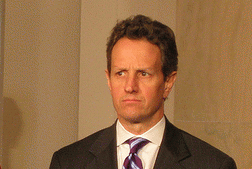Timothy Geithner's term as Treasury Secretary is reaching its end after four years and numerous scandals that include his 2010 arrest by the New York Police Department. Geithner first signaled he was thinking of leaving his post after the debt-ceiling negotiations that resulted in the Budget Control Act of 2011. In November 2012, rumors abounded that in response to public pressure Obama would ask Geithner to step down if he won a second term.
Geithner, however, will remain in his post until the end of the fiscal-cliff debates that have deadlocked Washington and a new Treasure Secretary is confirmed. Despite the multitude of financial scandals that Timothy Geithner has had a central role in, he will leave his post honorably and with one last indelible mark on yet another financial crisis. Geithner has been a central figure in the country's economic recovery since its collapse in 2008.
His work as President of the Federal Reserve of New York during the 2008 federal bailout resulted in his 2010 arrest by the NYPD. The disgraced financial giant American International Group (AIG) sparked public outrage in 2009 for administering $165 million in bonuses to executives from its financial-products group, despite their role in the bankruptcy of the organization, after accepting a government bailout. In addition to the $70 billion allocated to AIG through the Troubled Asset Relief Program, Geithner injected AIG with additional funds from the Federal Reserve in September and November of 2008. By 2009, AIG had collected an estimated $123.8 billion of taxpayer money.
Geithner was arrested and questioned in 2010 for his role in encouraging AIG from publicly disclosing payouts to banks involved in credit-default swaps with the insurance giant. Bloomberg News reported that a series of e-mails between the Federal Reserve and AIG revealed that the Fed pressured AIG to withhold disclosing certain information in its filings regarding the use of government funds. The result was a back-door bailout to numerous financial firms that members of Congress were not informed of. (Geithner's Fed Told AIG to Limit Swaps Disclosures, Bloomberg News, 1/7/2010)
In January 2009, Geithner was tapped by the newly elected Obama to serve as Treasury Secretary and play an even more influential role in the nation's economic recovery, despite the revelation that Geithner had failed to pay four years' worth of self-employment taxes. Soon after his appointment as Treasury Secretary, the Treasury Department announced its Public-Private Investment Partnership (PPIP), Geithner's brainchild, to help remove troubled assets from banks' balance sheets.
BlackRock Inc. was among the firms named as program managers of the PPIP. Geithner owes his career as a public servant to Pete Peterson, co-founder of the Blackstone Group, BlackRock Inc.'s parent company before incorporating independently. Peterson lobbied to have Geithner appointed to the Federal Reserve Bank of New York. Geithner returned the favor as President of the NY Federal Reserve by awarding BlackRock Inc. no-bid contracts to manage JP Morgan Chase's buy-out of Bear Stearns and the bailout of AIG. The no-bid contracts drew strong criticism from members of Congress, but Geithner defended them as a product of the chaos of the economic meltdown.
Geithner's name appeared, once again, in the Libor scandal that erupted in July 2012, which has been hailed as one of the largest financial corruption cases in history. The Financial Times published an article by a former trader that claimed the London Interbank Offered Rate, or Libor, was being manipulated. The Libor is an average interest rate calculated by the submission of the interest rates charged by the major banks in London. It was revealed in the scandal that banks had been colluding to either inflate or deflate the Libor to profit from trades. Geithner had been aware of the Libor manipulation since his days as President of the NY Fed.
Despite public calls from Congressional leaders to step down, Geithner will remain at his post through the fiscal-cliff negotiations. His favored replacements appear to be Jack Lew, Obama's current Chief of Staff, or Erskine Bowles. Bowles was appointed in 2010 to serve as co-chair of Obama's National Commission on Fiscal Responsibility and Reform, responsible for identifying measures to improve the country's fiscal situation. He currently leads the Campaign to Fix the Debt, a non-partisan group of policy makers and business leaders devoted to finding solutions to the federal-debt crisis. Bloomberg news has speculated that Geithner will move onto a think-tank such as the Brookings Institute or may even be tapped to replace Ben Bernanke as Chairman of the Federal Reserve.





